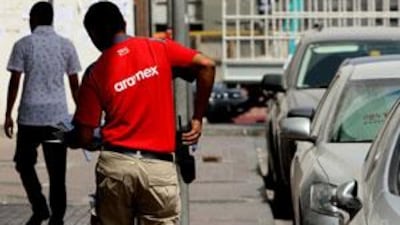Aramex couriers navigate the capital without addresses, street names - or cautious fellow drivers. Two hours into Mohammed Shafeeq Mughel's morning shift, he has nearly rear-ended two cars with broken brake lights, been cut off by a host of angry drivers and been blocked in by a parked lorry. But the delivery man keeps his cool. When one car forces him to brake suddenly, he calmly points out: "No brake lights working for this gentleman. That is dangerous." Mughel is a courier with Aramex, a company whose daily operations in Abu Dhabi are defined by the city's lack of a formal addressing system. Delivery men of all varieties - whether they carry packages, food or emergency services - must rely on landmarks to navigate streets that go by multiple names and reach destinations that are often specified with less than numerical precision.
But for Mughel, finding buildings is easy; it's the other drivers on the road he worries about. We pass a row of repair shops in the industrial area whose lots are filled with mangled cars. Mughel shakes his head at all the ripped metal and smashed glass. "This is just because they speed." Or it might be because they don't navigate quite as effortlessly as Mughel does. Mughel himself isn't exactly easy on the gas pedal, but after working as an Aramex courier for 16 years - and spending 13 of them specialising exclusively in Musaffah - navigating the roads for him is robotic. He knows the names of only a handful of streets, but he's mapped every back alley and tyre repair shop in his mind.
"You must know the area very well," I say. Mughel laughs for a few seconds. "Yeah." As a matter of strategy, Aramex tries to familiarise each of its drivers with one area. Unlike in New York, says Praven Eapen, where a person trying to get somewhere just needs a street name, building number and map, couriers here need an intimate knowledge of their surroundings. Eapen, who is in charge of quality services, boasts that in his three and a half years with the company, he's never heard of a driver getting lost. He says some couriers at Aramex are so familiar with the city that they can identify a client's location just by looking at the first three digits of his phone number.
Aramex also explores new neighbourhoods as they pop up. When people began moving to Khalifa City, Eapen helped drivers learn the various roundabouts and roads. He says they tried to follow the numbers on the streets, but there were too many duplicates. Eventually, someone gave them a map. "We realised there was two eight streets," he says, miming as though he was looking at the map. "One was here, and the other was there."
When it comes to Musaffah, though, Mughel the courier is beyond toiling with a map. He's there six days a week, driving eight to nine hours a day. He wakes up at 5am and arrives at the Aramex office on Muroor Road well in advance of his 8am departure time. By 7:45, the building is buzzing with activity as handfuls of couriers organise the morning's haul. Thousands of packages pass through the location daily.
Mughel sets out promptly at 8am, driving first down Airport Road then East Road. Once he arrives in Musaffah, the distance between stops may be no more than 30 metres. He drops off documents at Emirates National Sack Company, then a box at the Gasket Factory and then picks up a file at something called Information Fort LLC. When he hops back in the car, he drags his seat belt over only his left shoulder. In his lap is the run sheet for the day. He planned his route while idling in traffic on the way here - "preparing my mind", as he calls it. Now he reviews the preparations, sometimes filling in a separate sheet for packages he has picked up.
He says he loves the job and doesn't want to change areas. "If you are in one area for more than 13 years it's not a problem. Sometimes if there is a new company I need hints to where they are. But then it's easy to find out." He swerves to avoid a cab driver barrelling out of a driveway. Mughel has only been in one accident in 16 years. It was 12 years ago. A car changed lanes and smashed into him, wrecking the car but thankfully leaving him unscathed. "By the grace of God, I am still going on," he says.
As we pass more trashed vehicles, Mughel becomes reflective. "Driving is an art," he says. "What do you think?"

